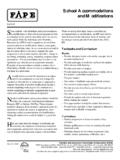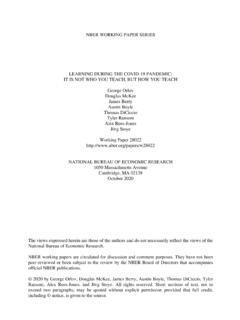Transcription of Issues and Challenges in Open and Distance e-Learning ...
1 International Review of Research in Open and Distributed learning Volume 17, Number 2 February 2016 Issues and Challenges in Open and Distance e-Learning : Perspectives from the Philippines Patricia Arinto University of the Philippines Abstract Rapid advances in information and communications technology in the digital age have brought about significant changes in the practice of Distance education (DE) worldwide. DE practitioners in the Phil-ippines open university have coined the term open and Distance e-Learning (ODeL) to refer to the new forms of DE, which are characterised by the convergence of an open learning philosophy, DE pedagogies, and e-Learning technologies. This paper discusses the Issues and Challenges that ODeL poses for the Philippines open university from the point of view of the institution s leading ODeL practitioners.
2 The paper concludes with a discussion of the policy development and administrative changes required to support innovative teaching practice across the institution. The findings and con-clusions are relevant for other institutions in the same stage of ODeL development. Keywords: Distance education, online learning , e-Learning , open and Distance e-Learning Introduction Rapid advances in information and communications technology (ICT) have brought about significant changes in the field of Distance education (DE) since the mid-1990s. These are encapsulated in the shift by many DE institutions from print-based to online delivery using virtual learning environments (VLEs) and various Web technologies. This has so altered the organisation, practices, and cultures of DE (Abrioux, 2001; Bennett, Agostinho, Lockyer & Harper, 2009; Cleveland-Innes, 2010) that DE scholars have characterised it as a generational shift (see, for example, Taylor, 2001).
3 163 At the University of the Philippines Open University (UPOU), a single-mode DE institution in the Philippines, the term open and Distance e-Learning (ODeL) has been coined to refer to the new mode of online or Web-based DE. More specifically, ODeL refers to forms of education provision that use contemporary technologies to enable varied combinations of synchronous and asynchronous commu-nication among learners and educators who are physically separated from one another for part or all of the educational experience" (Alfonso, 2012, ). ODeL expands the term open and Distance learning or ODL to include use of e-Learning or online learning methodologies to enable multiple forms of interaction and dialogue that can bridge the Distance between teachers and learners (Ander-son, 2008c; Calvert, 2005; Garrison, 2009) and provide access to a vast array of interactive and mul-timedia learning resources that can be used to design learning environments for learners in diverse circumstances (Bates, 2008; Haughey, Evans & Murphy, 2008; Tait, 2010).
4 Using online portals and VLEs further enables DE institutions to support both independent learning and collaborative learning through increasingly complex pedagogical structures (Haughey et al., 2008, p. 15). Indeed, 21st century DE is distinguished from older forms of DE by flexibility and adaptability of de-sign (Garrison, 2000; Haughey et al., 2008; Tait, 2010). While industrial era DE deployed standard-ised, normalised and formalised procedures for design and delivery (Peters, as cited in Burge & Polec, 2008, p. 238), in online DE the boundary between course development and course delivery is increasingly blurred and former course development roles .. are being deconstructed and reinvent-ed (Abrioux, 2001, p. 1) as the role of teachers in the design of pedagogically effective learning envi-ronments receives renewed emphasis (Anderson, 2008c; Bennett et al.)
5 , 2009). Moreover, DE course designs are increasingly resource-based (Calvert, 2005; Naidu, 2007), and in some cases, online discussion-based (Jara & Fitri, 2007), with course contents that are more fluid and dynamic be-cause they are created during synchronous and asynchronous online collaborative activities (Mason, 1998). These pedagogical changes in DE underscore the fact that online technologies are not neutral: they are like a trojan mouse that teachers let into their practice without realizing that it will require them to rethink not just how they use particular hardware or software, but all of what they do (Sharpe & Oli-ver, 2007, p. 49). Furthermore, pedagogical change is complex and often challenging not only for in-dividual teachers but also for the DE institution as a whole.
6 As Abrioux (2001) has noted, the en-hancement of old models of Distance education by taking advantage of the e-Learning environment is just as challenging as the adoption of online learning by conventional institutions because the [very same] institutional infrastructures and learning /teaching support which, in the past, complemented the individual academic s expertise and served to create a comprehensive high quality learning environment for Distance learners (p. 1) might also now constrain innovative prac-tice by Distance This paper discusses key Issues and Challenges in ODeL implementation as experienced and perceived by 10 academics at UPOU, and their implications for institutional policy and practice. UPOU exempli-fies Abrioux's (2006b) university within a university model, an institutional arrangement designed 1 The constraining infrastructure includes capital investments such as printing presses, television and radio production, course material warehouses, and various administrative and computing systems and institutional investments in human resources.
7 And labor relations structures (Abrioux, 2001, p. 1). 164 to protect the ODL culture in a dual-mode institution (p. 5). One of seven universities and an auton-omous college comprising the University of the Philippines (UP) system, UPOU was established in 1995 to democratise access to quality higher education through DE. It offers three undergraduate pro-grammes, 24 graduate programmes, and two doctoral programmes in what Becher (1989) calls soft applied Majority of its students are Filipino citizens between 20 and 40 years old (Flor, Bandalaria, Sibal & Jarmin, 2008) with full- or part-time employment. About 80% are based in the Philippines and the rest live and work The faculty complement consists of 26 full-time faculty members and about 200 faculty affiliates who teach part-time at UPOU.
8 The small complement of full-time faculty is part of a strategy adopted by UPOU s founders to forestall doubts about the quality of DE, which is perceived by some to be inferior to face-to-face teaching, by having the faculty of the more established units develop and deliver most of UPOU s courses (Arinto, 2007). UPOU started out with a print-based mode of course development and delivery. In 2000 it introduced online tutorials using an open source learning management system (LMS) initially for students who were unable to attend the monthly face-to-face tutorial sessions. As students became more widely dis-persed geographically and as the Internet became more accessible to teachers and students alike, online tutorials became the default tutorial mode for all courses, and in 2007 UPOU shifted to a Moo-dle-based online learning platform.
9 Aside from an increased emphasis on resource-based course de-sign, this also marked a shift to the development of new courses via a reduced version .. of the course team approach (Power, 2007, p. 65) where individual faculty members both design and deliver the courses asynchronously online . In addition to the Moodle VLE, some of UPOU s full-time faculty cre-ate course blog sites and use Web-based conferencing systems and social networking services. While the old printed course modules have not been phased out, course instructors are expected to update the modules by supplementing them with relevant resources and by introducing new learning activi-ties and assignments. In sum, the DE model at UPOU is one where students: (a) engage in guided independent study of mostly text-based course packages; (b) participate in computer-mediated discussion and collaborative learning activities conducted asynchronously through a Moodle-based VLE; (c) submit assignments; and (d) for most courses, sit for a proctored final examination at a UPOU learning centre or testing UPOU is not entirely unique as a DE institution and this case study of the ODeL Issues and Challenges that UPOU is confronting in today s rapidly changing DE context should provide insights that would be relevant for similarly situated DE institutions.
10 2 UPOU offers programmes in such disciplines as environmental management, development communication, and public administration. The full list of programme offerings is available at 3 The offshore students, as the non-Philippine-based students are called, are dispersed in more than 40 locations worldwide, including the United States, United Arab Emirates, China, Hong Kong, Japan, Korea, and many other countries where there are overseas Filipino workers. 4 Some FICs administer online examinations using the quiz feature on Moodle or via email. 165 Methodology This paper reports part of the findings of a collective case study of ODeL course design practice in a DE institution based on the experiences of 10 university faculty.












